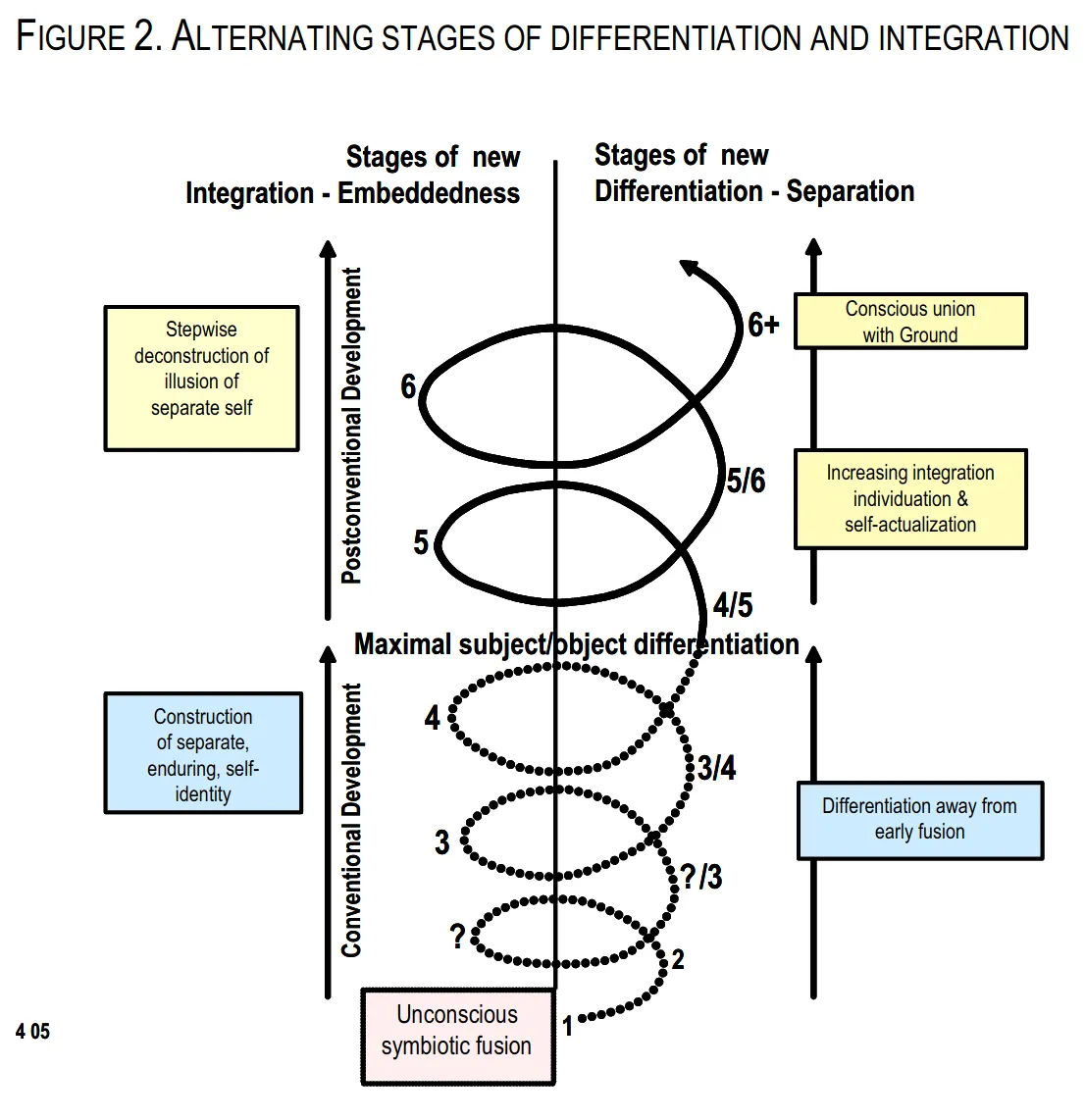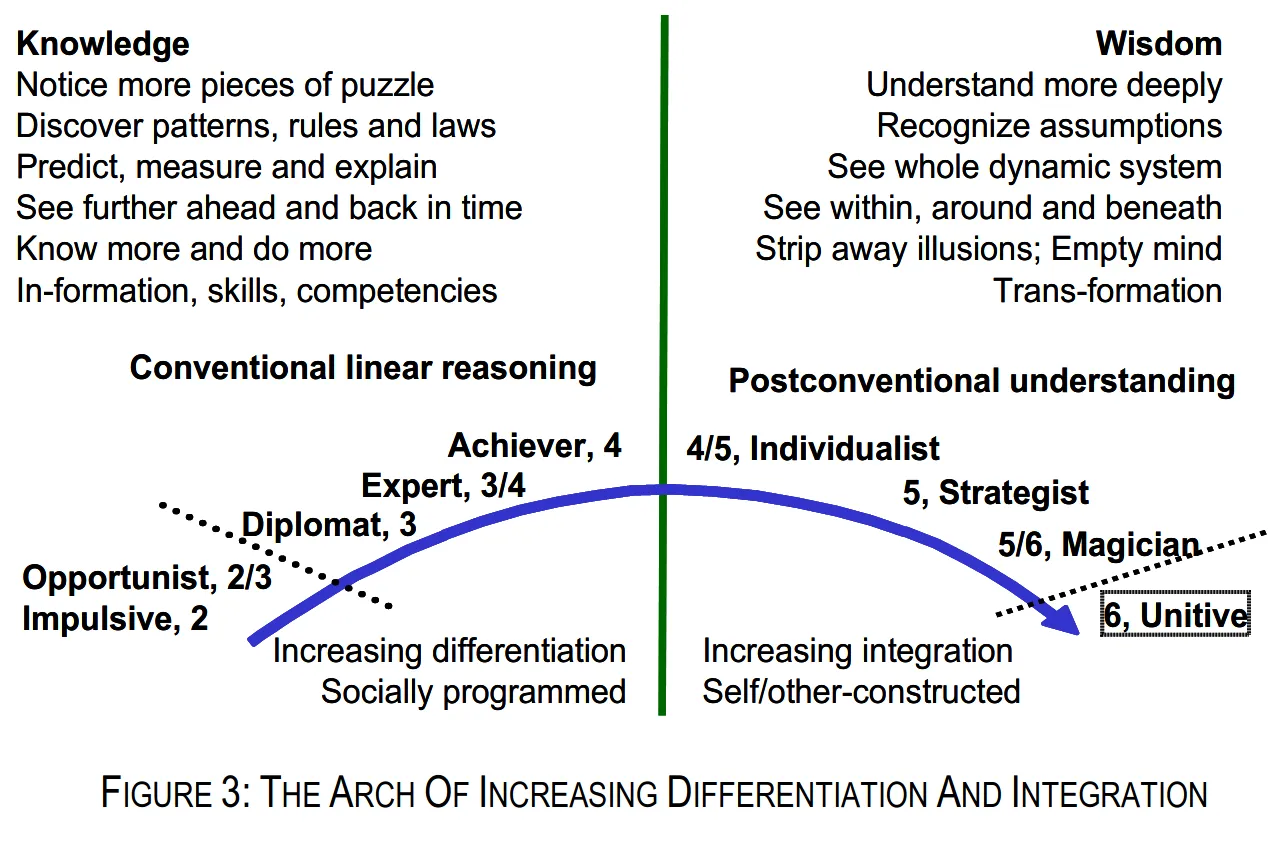📖Nine levels of increasing embrace in ego development: a full-spectrum theory of vertical growth and meaning making
- authors
- Susanne R. Cook-Greuter
- year
- 2013
- url
- http://www.cook-greuter.com/Cook-Greuter%209%20levels%20paper%20new%201.1%2714%2097p%5B1%5D.pdf
- EDT: Ego Development Theory
p.3
Derailment in development, pockets of lack of integration, trauma and psychopathology are seen at all levels. Thus later stages are not more adjusted or “happier.”
- field of constructivist development
- p.4 developed based on sentence completion test over 40 years
- p.5 the stages are idealizations. nobody is 100% at one stage or another. the responses distribute over at least 3 levels. “center of gravity” at one stage. “trailing” or “secondary” stage—as a fallback under stress.
- p.5 limitation: sentence completion (“short verbal stimuli”) rarely elicit ego-transcendent responses
- p.7 “earlier”“later” instead of “lower”“higher”
- p.8 for a healthy ego, the responses are expected to range over a broad range of stages, not just late-stage
- p.8 it takes about 5 years to move to a new level (minimally, a year of well-designed development program)
- p.9 defense mechanism is a way to screen out phenomena that do not fit already existing view of reality (Sullivan, 1953)
p.9
The ego maintains its stability, its identity, and its coherence by selectively gating out observations inconsistent with its current state–granting that one person’s coherence is another person’s gibberish. —Loevinger
- p.9 the later the stage, the less defense is needed—i.e. experiences can be accepted as they are
p.10
While possibly exciting, stage change is also likely accompanied with considerable discomfort, pain, losses, and uncertainty. […] Moreover, our own strongly held values have to be renegotiated when we enter a new view of reality.
- p.11 the EDT is changing and adapting to the new evidence. it is dynamic
psychometricians prefer static variables
Just look at the MBTI which has been shown to have marginal validity, yet is a measure used world-wide.
- p.11 structure vs. content
p.13
“Not everything that counts can be counted, and not everything that can be counted counts.” (Sign supposedly hanging in Einstein’s office at Princeton).
- p.13 components
- operative (doing)
the purpose of life, needs acted upon, ends moved towards, coping
- affective (being)
emotions and the experience of being in the world
- cognitive (thinking)
how a person thinks and reasons about themselves and the world
- p.15 alternation of integration/differentiation stages
integration/differentiation happens between stages as well as on the scale of the whole spiral

p.16 stages 3,4,5,6 (single-number stages) — are stages of integration, stages with slashed number (2/3, 3/4, 4/5, 5/6) are stages of differentiation
At the same time they generally express some distress because of the loss of the connections and certainty they leave behind.
p.16 overall differentiation/integration

- Later stages are not necessarily better than earlier—it is a matter of optimal fit
- each new stages has its own strength and deeper insights, as well as its stage-specific vulnerabilities and new forms of unhealthy expression
p.20
It is seen as a sign of later stage capacity if one has access to prior stages and can choose to employ their strengths depending on the context and the need of the situation.
- p.20 EDT is a theory of adult development
- stages
- 1. Symbiotic
- 2. Impulsive
- 1st person perspective
- 2/3. Self-Protective or Opportunistic
- Opportunist version is aware of their physical strength and size (or status) and may use it to intimidate others.
Self-protective—shy or physically less strong.
Because of their greater strength and the supremacy of males in many cultures, it is more often women who inhabit this world.
Focus on protecting themselves and not becoming a target of other’s aggression.
- the self is synonymous with one’s will, ideas, wishes
- Delta/3. Rule-Oriented
- subsumed under Conformist-Diplomat (3)
- Self-protective → Delta/3 → Conformist
- society provides protection as long as you follow the rules
- statistically-rare
- ability to take 2nd person perspective
- 3. Conformist (Diplomat)
- part of the group. boundaries between self and in-group confused; over-identified
- tend to accept norms without inspection or questioning
- it’s “us” against “them” (vs “me” against “them” as in Self-protective)
p.31
It is difficult for someone whose self-sense is based on belonging to such a group to even realize that there may be others of different faiths who believe equally fervently that they have the only truth.
- rules are internalized and followed without question
- 3/4. Self-conscious or Expert
- want to be differentiated from others, be recognized as special
- “Good enough” is not good enough for many experts
- focused on doing the things right, not doing the right things
- over-focused on details
- their way of work is the best. hard to delegate task. when delegated, Experts wants the task to be done exactly the same way they would have done it
- “If I can do it, you can” is a common message that shows the lack of awareness that people differ and that their way may not work for everyone
- 4. Conscientious or Achiever
- Conscientious stage is a stage of integration and re-embedding oneself in a larger cultural context, but now on ideological affinities and self-chosen criteria
- 4/5. Individualist or Pluralist
- 4th-person perspective. able to look at systems as systems
p.54
The transition to the first postconventional stage is a watershed in so far as it is the first time that the vertical move and the questioning of previously unexamined ideas is no longer supported by society and its chief conventional representatives.
- 5. Autonomous (Strategist)
- enlarged 4th-person perspective. embedded in history and multiple cultural contexts
- lifetime view
- can perceive system patterns and long-term trends and are often valued for that “strategic” vision
- parallels Yellow
- Loevinger called this stage “autonomous” because individuals can make meaning autonomously, independent of conventional ideas.
- crucial new ability is to realize that one can generate meaning
- strategists are often motivated and infused with a grand purpose and a vision of what could be (life purpose)
- p.64 Strategists want to hone themselves as instruments of change. They realize that they need to be the most they can in order to be of most service to others.
- p.65 Strategist is preoccupied with developing other people and can be impatient when they are slow to grow. This need is one of central flaws of this stage (along with attachment to knowing and being coherent)
- p.65 Unlike individuals at the conventional stages, seeking therapy, advice, or consulting from others, is not seen as a weakness, but as a necessity and an actual strength.
- p.66 Sometimes Autonomous persons find ordinary constraints of life stultifying such as making a living and working an eight-hour day. They see themselves as being destined for bigger tasks with a far-reaching impact different from ordinary folks. They would prefer to enjoy their passions for influence and power on their own terms with maximal freedom or a mandate to do so for the benefit of all.
- p.67 trying to become the most one can become in contrast to Achiever’s hoping to be the best one can be.
- p.67 Although Autonomous folks experience role conflicts and dilemmas strongly, they recognize that these are inescapable and that ambivalent feelings are natural.
- p.70 When irreconcilable role conflicts are discovered, there may be a deep unease and yet also a greater tolerance for feeling dissatisfied, ambivalent or confused than at earlier levels.
- 5/6. Construct-aware or Ego-aware (Magician, Alchemist)
- 5th person perspective and beyond
- Some individuals seem to be more alert to the experience of living life in a fundamental quandary of questioning their own questioning and seeking (Ego-aware) while others focus more on the construction of meaning and the language conundrum (Construct-aware).
- p.79 Once human beings realize the fundamental function of the ego to create a sense of permanence and saliency, they may experience their full and inevitable ego-centricity.
- 6. Unitive
- catch-all level for many stages above 5/6